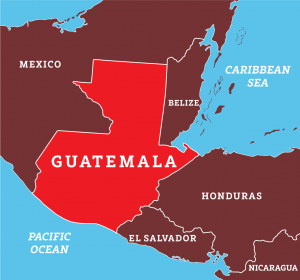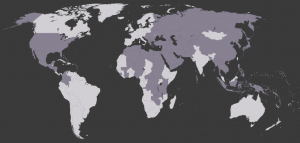GUATEMALA: PRESIDENT MORALES’ ESCALATING CONFRONTATION WITH CICIG
Why It’s Important
On January 7, Guatemala’s President Jimmy Morales made a unilateral decision to expel CICIG – a UN backed anti-corruption body – from the country.
Mandated to investigate and prosecute corruption and organized crime, CICIG has opened investigations against the President’s brother and son on corruption charges – and against Morales himself – for illicit financing of his presidential campaign.
The Constitutional Court has ruled the President’s decision illegal but is being challenged by Congress, which has initiated a process to remove judges seen to view CICIG favorably.
While tensions have often surfaced between the Guatemalan government and CICIG, these developments are the most consequential to date.
Latest Developments
During her January 7 meeting with UN Secretary-General António Guterres, Guatemalan Foreign Minister Sandra Jovel gave international staff of the International Commission Against Impunity in Guatemala (known by its Spanish acronym CICIG) 24 hours to leave the country. On the heels of the Foreign Minister’s announcement and citing myriad risks to Guatemala’s national interest and security, President Jimmy Morales declared his unilateral decision to withdraw from CICIG’s founding agreement and expel the body. The move, which hobbles the ability of the UN-backed anti-corruption commission to operate in the country, is a major setback for efforts to address impunity and corruption.
Swift and widespread internal opposition and international condemnation followed, although important sectors of society support the President’s decision. The UN Secretary-General promptly rejected Morales’ move and urged Guatemalan authorities to uphold their obligations through CICIG’s September 2019 term. And in a rebuke to the President, Guatemala’s Constitutional Court ruled the presidential decision illegal and issued a stay. In the meantime, and although CICIG’s Guatemala City office remains open, ongoing investigations have been effectively halted as international staff depart the country as a preventive security measure.
CICIG: A Powerful Anti-Corruption Force
Established in 2006 at the request of the Guatemalan government and operating under UN auspices and Guatemalan law, the commission acts as a complementary prosecuting agency. CICIG’s broad mandate authorizes it to support national justice and anti-corruption efforts and carry out independent investigations of crimes “allegedly committed in connection with the activities of illegal security forces and clandestine security organizations”. It has served as a groundbreaking accountability mechanism for Guatemala and is seen as a model for other countries facing similar challenges.
CICIG has proven as unique as it is effective. Since 2007, the commission is estimated to have contributed to a net reduction of more than 4,500 homicides. It has provided important momentum and broad public buy-in for anti-corruption initiatives. The commission’s 2015 revelations sparked massive protests that effectively unseated the governing Patriot Party and led to scores of business and political elites to be held in remand. Some, including the former Vice President, have already been sentenced to prison, several are facing trials, and many remain under active investigation for corruption charges – including former President Otto Pérez Molina.
Under the leadership of Iván Velásquez, a former magistrate who led investigations on the links between paramilitary groups and politicians in his native Colombia, CICIG has further intensified its anti-corruption efforts. Velásquez opened numerous cases related to the embezzlement of public funds, tax fraud, money laundering and illicit financing of political campaigns. In 2016, together with Guatemala’s then-Attorney General Thelma Aldana, Velásquez also spearheaded ambitious yet controversial efforts that produced important legislative and electoral reform proposals.
CICIG has served as a prospective model for countries grappling with pervasive corruption, transparency and accountability issues. Yet, for all its progress, Guatemala remains a highly corrupt country. Global anti-corruption watchdog Transparency International ranked it 143 out of 180 countries on its 2017 Corruption Perceptions Index, reflecting popular discontent with the judiciary, a weak civil service and public procurement mechanisms.
Government Backlash
President Morales’s expulsion of CICIG could be viewed as a concerted effort by individuals seeking to protect themselves against investigations and potential prosecution, possibly including the President himself. Morales’ urgency may also suggest imminent existential threats emanating from the commission’s work.
Morales has not always been such an active or outspoken critic. Following his landslide 2015 electoral victory, Morales offered praise for CIGIG and sought to renew its mandate on two subsequent occasions. But after CICIG opened corruption investigations into the President’s brother and son – and then against Morales himself for the illicit financing of his presidential campaign – he did an about face and declared Velásquez persona non grata in August 2017. Legal action by Guatemala’s human rights ombudsman and a ruling of the Constitutional Court impeded Velásquez’s expulsion. In September 2018, Velásquez left the country and has been overseeing CICIG from UN headquarters in New York.
In addition to forcing Velásquez’s exodus, since 2017 the use of intimidation tactics by entrenched interests have proliferated in their frequency and intensity. Morales marked his earlier announcement refusing CICIG’s mandate renewal with the deployment of army vehicles – donated by the U.S. to combat drug trafficking in border areas – which patrolled the streets in front of CICIG headquarters, the U.S. embassy and activists’ homes. Anti-reformist politicians in Congress have spearheaded smear tactics against Velásquez and prominent prosecutors, and the sacking of Interior Minister Francisco Rivas resulted in his anti-reformist successor withdrawing some of the police protection provided to CICIG.
What Next For CICIG?
Escalating tensions do not bode well for CICIG and raise questions about the current crisis’ impact on Guatemala’s ability to address impunity and corruption in the longer term. The President’s confrontation with the Constitutional Court continues to intensify. Two previous pro-CICIG rulings allowing Velásquez re-entry presaged the nearly-unanimous 9 January ruling to block Morales’s decision to expel the commission (a single judge – a Morales appointee – dissented). A day later, Congress initiated a process to remove judges seen to view CICIG favorably. If successful, such a move, which has the support of business elite and the president’s National Convergence Front party, could have serious implications for the judicial system’s efforts to combat organized crime.
While the effort to dismantle CICIG may be successful in protecting some individuals from prosecution, the long-term fate of President Morales, who is constitutionally prohibited from running in the June 2019 elections, is by no means secure. A former TV comedian, Morales won the 2015 elections running under the slogan ‘neither corrupt nor a thief’ and is an inexperienced leader who could eventually face legal proceedings. This, despite the repeated refusal by the Congress to rescind his presidential immunity and its successful effort to reduce the punishment for the illicit campaign finance crimes of which Morales stands accused.
What happens next will also depend on the response of one of CICIG’s largest donors: the United States. Morales has worked to curry favor with the Trump administration, which he lobbied hard to secure a one-on-one meeting with the President. Several months after their February 2018 introduction, Morales moved Guatemala’s Embassy in Israel from Tel Aviv to Jerusalem. On recent developments, the Trump administration has spoken through its State Department, issuing a vaguely-worded statement expressing support for Guatemala’s anti-corruption efforts but failing to mention CICIG by name.
Recent developments indicate that the scales are tipping in President Morales’s favor. His hawkish stance vis-a-vis CICIG, which commands vocal support in some political circles, combined with intensified backing in Congress, presents a serious challenge to the country’s institutional stability. For the time being, Morales appears determined in his efforts to oust CICIG and obstruct ongoing investigations, and willing to push the country towards a deeper, constitutional crisis.

